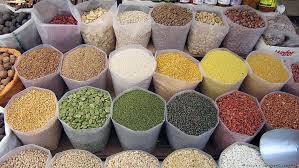- Courses
- GS Full Course 1 Year
- GS Full Course 2 Year
- GS Full Course 3 Year
- GS Full Course Till Selection
- Answer Alpha: Mains 2025 Mentorship
- MEP (Mains Enrichment Programme) Data, Facts
- Essay Target – 150+ Marks
- Online Program
- GS Recorded Course
- Polity
- Geography
- Economy
- Ancient, Medieval and Art & Culture AMAC
- Modern India, Post Independence & World History
- Environment
- Governance
- Science & Technology
- International Relations and Internal Security
- Disaster Management
- Ethics
- NCERT Current Affairs
- Indian Society and Social Issue
- NCERT- Science and Technology
- NCERT - Geography
- NCERT - Ancient History
- NCERT- World History
- NCERT Modern History
- CSAT
- 5 LAYERED ARJUNA Mentorship
- Public Administration Optional
- ABOUT US
- OUR TOPPERS
- TEST SERIES
- FREE STUDY MATERIAL
- VIDEOS
- CONTACT US
PROMOTION OF CLIMATE RESILIENT FARMING REPORT
PROMOTION OF CLIMATE RESILIENT FARMING REPORT
14-02-2024
- The Standing Committee on Agriculture, Animal Husbandry, and Food Processing presented a report on the 'Promotion of Climate Resilient Farming'.
- The Standing Committee on Agriculture, Animal Husbandry, and Food Processing is a committee in the Lok Sabha. It is made up of 31 members, including 21 members from the Lok Sabha and 10 members from the Rajya Sabha.
-
Importance of Climate Resilient Farming:
- Given the vulnerability of Indian Agriculture to climate change, adopting climate-resilient farming practices is crucial.
- Climate-resilient farming involves sustainable utilization of natural resources in crop and livestock production systems to ensure long-term productivity and higher farm incomes amidst climate variations.
- Outcomes of Climate Resilient Farming:
- Improved access and utilisation of technology
- Increased use of resources conservation technologies
- An increased adaptation of crops and livestock to climatic stress
- Reduces hunger and poverty (by sustaining agricultural production)
- Reduced greenhouse gas emissions
- Increased resilience against longer-term stressors like shorter seasons and erratic weather patterns
-
Need for Climate Resilient Farming:
- Crops and Horticulture: Yield is expected to decrease due to climate change.
- For example, rainfed rice yields in India are projected to decline by 20% in 2050 and 47% in 2080.
- Hailstorms during flowering and fruit set stages lead to reduced mango production.
- Livestock: Rising temperatures may impact livestock physiology (science of life) and energy expenditure, resulting in reduced output of milk, meat, wool, and draught power.
- Fisheries Sector: A 1°C temperature rise can disrupt fish survival, migrations, and habitats, potentially causing stocks to permanently relocate to new areas.
-
Key Recommendations of the committee:
- Establishment of the National Agriculture Disaster Management Authority (NADMA) as a single nodal agency at the national level to address climate change issues.
- Transformation of Krishi Vigyan Kendras (KVKs) with technologies like Artificial Intelligence for enhanced farmer support.
- KVKs are agricultural extension centers that are part of National Agricultural Research System (NARS) & created by Indian Council for Agricultural Research (ICAR) and its affiliated institutions at the district level.
- They serve as a knowledge and resource center of agricultural technology, supporting initiatives of the public, private, and voluntary sector.
- Adoption of technologies like Big Data analytics to optimize irrigation schedules and promotion of carbon market in agriculture.
-
National Programmes for Climate Change Adaptation
- National Mission of Sustainable Agriculture: Initiated in 2010 as part of the National Action Plan on Climate Change (NAPCC) to promote the prudent (well judged) management of available resources.
- Pradhan Mantri Krishi Sinchayee Yojana (PMKSY): Introduced in 2015 to tackle water resource issues and promote a permanent solution emphasizing Per Drop More Crop.
- Paramparagat Krishi Vikas Yojana: Aims to extensively adopt climate-smart practices and technologies in collaboration with the Indian Council of Agricultural Research and state governments.
- Green India Mission: Launched in 2014, aims to protect, restore, and enhance India’s reducing forest covers to mitigate climate change effects. It operates under the NAPCC umbrella.
- Soil Health Card scheme: Analyses soil samples to inform farmers about their land fertility status.
- Neem-Coated Urea: Introduced to minimize excessive urea fertilizer use, preserving soil health and providing plant nitrogen.
- National Project on Organic Farming and National Agroforestry Policy: Aim to benefit farmers financially while protecting ecosystems &focus on organic farming, improving soil carbon stock, and preventing soil erosion.
Case study: Role Models
|



